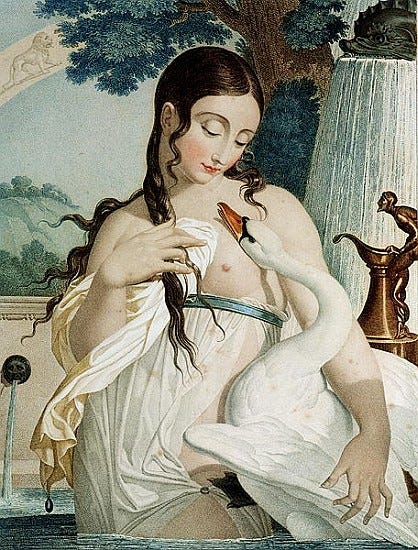The month of Thermidor, from a set of illustrations to the Calendrier Republicain of Fabre d’Eglantine.
According to the Republican calendar, introduced during the revolution of 1789, and almost as speedily dumped by Napoléon I, this month is Messidor, from Latin messis -'harvest'. In a few weeks it will be Thermidor (from Greek thermon - 'summer heat'.)
It was a good idea - a calendar with months named for what went on at that time in the countryside. But like most good ideas, it didn’t last ; nor did its inventor, Fabre d’Eglantine - who went to the guillotine, if you can believe the legend, tossing scraps of poetry from the tumbril.
His house was just a few hundred metres from where I’m writing this – almost on the spot where the city recently erected a modest monument to another local hero, the singer Charles Aznavour, who was born in the neighbourhood.
All of which reminds me….
When I first visited Paris, long before I moved here, I was in love with a French woman named Céline whom I met in London. My first French older woman, as it happens; a relationship that leaves one utterly changed. Well, it did me, at least.
Once she went home, I slipped across to Paris every few weeks to spend a weekend in her sprawling apartment in the seizieme.
Her grown-up daughter kept a room there but never visited, at least not when I was around, and though a femme de ménage came twice a week to clean, all I saw of her was a fresh wax shine on the parquet and new linen on the bed. Woven so densely it felt heavy, as though soaked in water, each sheet was embroidered with an incomprehensible monogram, signifying Céline's marriage to a husband even less evident than the daughter; barely more than a phantom presence somewhere on the far side of the world.
Céline was as much teacher as lover. Years later, in Le Divorce, a novel by the American writer Diane Johnson, I saw my experience mirrored in that of her main character, an American girl who becomes the lover of a much older Frenchman. Revelling in the way he instructs her in the intricacies of life in Paris, she muses "If you didn't know where to look, you could pass your whole life with no sense of what you were missing."
It was August, a month that descends on Paris like a curse. Empty streets echo to the clatter of jack-hammers as café owners rush through renovations before their clientele floods back in early September. By noon, it was too hot to move, to eat, certainly to make love, so we read and dozed, pressing to our foreheads the glasses of home-made limeade, beaded with moisture, that we drank by the litre.
In another room, a radio was tuned, almost inaudibly, to a jazz radio station. After a few bars of one tune, Céline opened violet eyes, and murmured a few words.
"......balayé par Septembre ,notre amour d'un été..."
They meant nothing to me but I thought I recognised the voice.
"Is that Aznavour?"
"Yes. Paris au mois d'Aôut. Paris In the Month of August."
At the time, I only caught the sense of the song. Later, I looked up the words, and their translation.
Swept away by September
Our summertime love
Sadly comes apart
And dies, in the past tense
Even though I expected it,
My heart empties itself of everything.
It could even be mistaken
For Paris in the month of August.
The words caught the lassitude of what the French call le canicule, so much more evocative than "heat wave." Canicule because these are the "dog days" when Sirius, the Dog Star, is in the ascendant. The languorous despair evoked by the song was almost pleasurable. As Noel Coward said, "Strange how potent cheap music is."
"Comme il est triste," Céline sighed as she listened. "Just right for Thermidor."
"Thermidor?" I said. "Like Lobster Thermidor?"
She punched my arm, but playfully.
"No! Not like the lobster - or not only like the lobster, at least. Why is it always food with you? Or films."
"Tell me, then."
She let her book fall and leaned back on the cushions of the couch.
"Very well. But first you must kiss me."
And of course I did as I was told.




